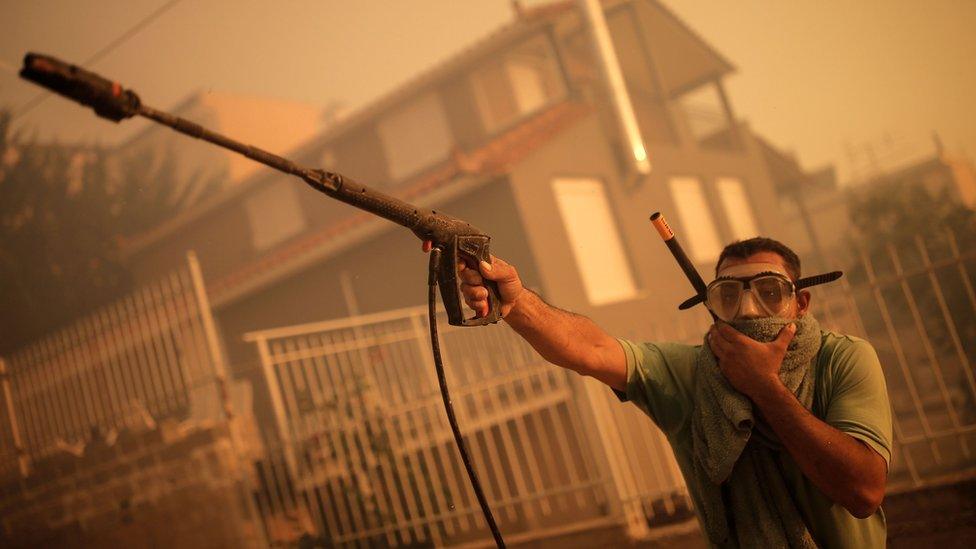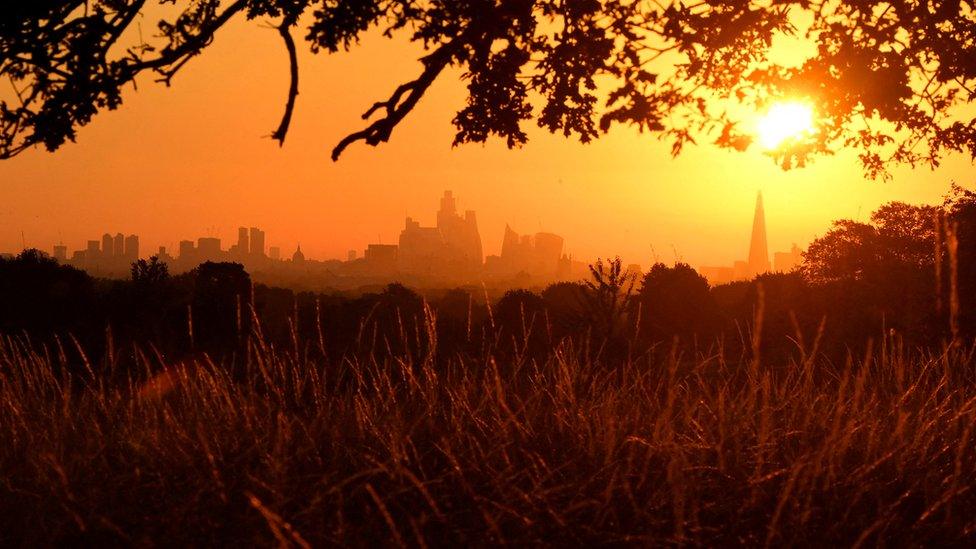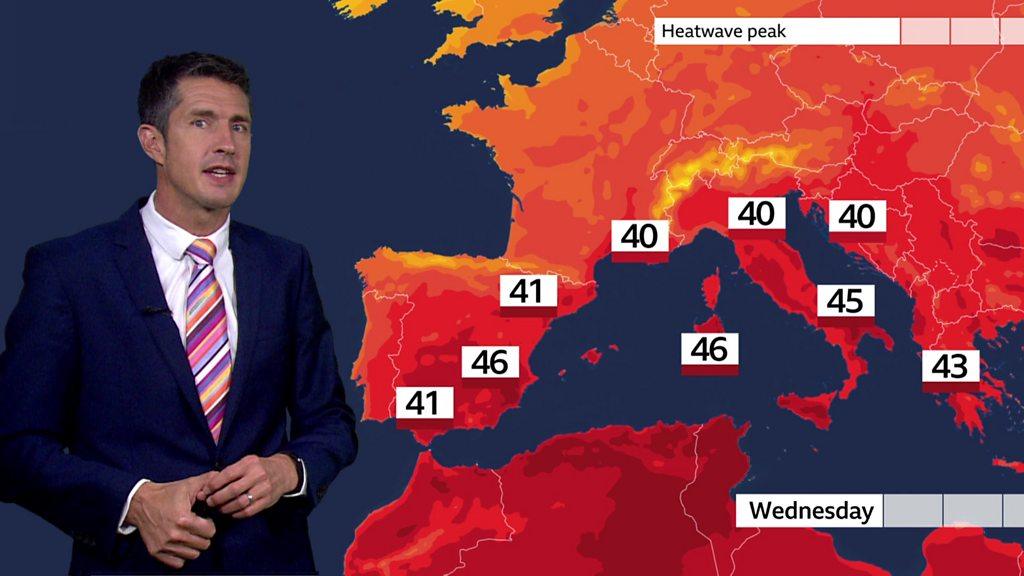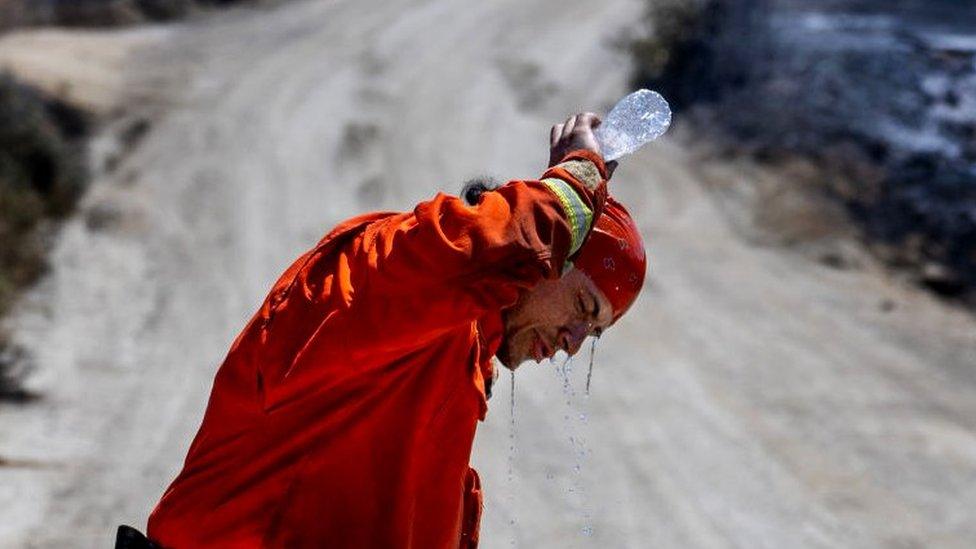Greece wildfires: 1,200 children evacuated from summer camp as blaze nears
- Published

High winds have been fanning flames in parts of Greece after wildfires broke out
More than a thousand children have been evacuated from a summer camp after wildfires broke out in Greece.
Two separate blazes are tearing through the country as it suffers the effects of a scorching Mediterranean heatwave.
In the coastal town of Loutraki, west of Athens, 1,200 children were evacuated as flames approached their camp.
Meanwhile, police arrested a man suspected of starting another blaze in Kouvaras, south-east of the capital.
Dozens of people have had to leave their homes in the wider area, assisted by emergency service crews. Several animals also had to be evacuated, including a number of horses that were in stables that caught fire.
The Greek government said those whose homes had been affected by the fires were eligible for accommodation in local hotels and they would be later be compensated.
One home owner in Kouvaras, Anna Vlachou, told the Reuters news agency that while her house had not yet burned, there were "many fronts" and no sign yet of firefighters.
The wildfires were fanned by strong winds, with hundreds of firefighters battling to contain the spread of the flames.
Greek fire service spokesperson Ioannis Artopios said while the winds were making it difficult for aircraft to approach the fires safely, firefighters were "making every effort".
Dimitris Zafiropoulos, a resident of the village of Saronida, close to Kouvaras, said firefighters had not reached there either.
"Some guys tried to rescue a house but it is impossible," he told Reuters.
"The fire is too heavy, the wind is very very strong so there is nothing that they can do."
Journalist Daphne Tolis, who is in Athens, said there was no indication that anyone had been trapped by the flames. She added that the coastguard had told boats to remain in the sea in case an evacuation by sea was required.
The fires have affected transport in some areas, with police forced to shut sections of the Athens-Corinth national highway. Some train services have also been disrupted.
Greek Prime Minister Kyriakos Mitsotakis, who is currently in Brussels for a summit, said the state was doing everything possible to help.
"Today was the first essentially difficult day of this summer," said Mr Mitsotakis.
"No doubt more will follow. Wildfires have occurred and will continue to occur. This is also one of the effects of the climate crisis that we are experiencing with increasing intensity."
While at least one of the fires is suspected to have been started deliberately, scientists say extreme weather is becoming more frequent and more intense in many places because of the warming planet.
According to weather watchers, the intense regional heatwave shows no sign of easing. The Greek meteorological service, meanwhile, has warned that the risk of further fires remains high.
Greek television showed several houses and cars gutted by the blaze, while thick white smoke rose from burning vegetation.
In the village of Kalyvia, also near Kouvaras, thick smoke blocked the roads and monks were evacuated from a local monastery.
Greece has hit temperatures of 40C (104F) or more in recent days. The Acropolis in Athens - the country's most popular tourist attraction - was closed during the hottest hours of Friday and Saturday to protect visitors.
It resumed its regular opening hours on Monday but a new heatwave is expected later this week.
Neighbouring countries including Italy and Spain have been also experiencing unusually high temperatures.
"Temperatures will reach a peak between 19 and 23 July - not only in Italy but also in Greece, Turkey and the Balkans," Italian meteorologist and climate expert Giulio Betti told the BBC.
"Several local heat records within these areas may well be broken during those days."

Related topics
- Published13 July 2023

- Published18 July 2023

- Published17 July 2023

- Published17 July 2023
